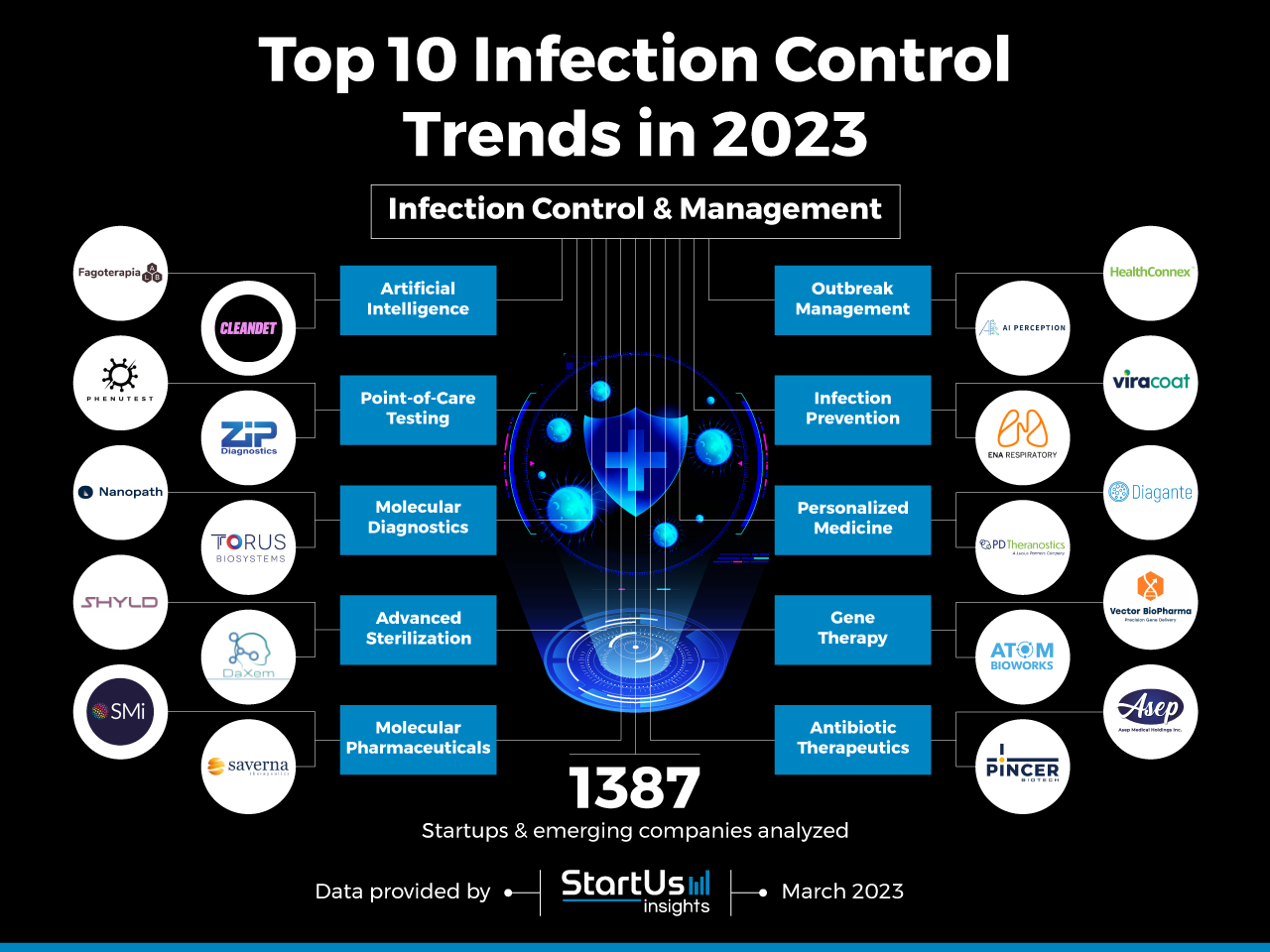Accelerate Productivity in 2025
Reignite Growth Despite the Global Slowdown
Infections are a major healthcare challenge, causing high levels of morbidity, mortality, and healthcare costs. The COVID-19 pandemic highlights the critical need for effective infection management and prevention. However, conventional methods of infection control, such as hand hygiene and disinfection, have become inadequate due to the rise of antibiotic-resistant bacteria and human carelessness. Consequently, startups working in the infection control spectrum develop technology solutions to tackle these challenges, including rapid diagnostic tests, digital infection tracking systems, and novel disinfection technologies. These infection control trends and advanced solutions empower hospitals, clinics, and medical professionals to manage and prevent infections more efficiently, resulting in better patient outcomes.
Innovation Map outlines the Top 10 Infection Control Trends & 20 Promising Startups
For this in-depth research on the Top 10 Infection Control Trends & Startups, we analyzed a sample of 1387 global healthcare startups & scaleups. This data-driven research provides innovation intelligence that helps you improve strategic decision-making by giving you an overview of emerging technologies in the healthcare industry. In the Infection Control Innovation Map below, you get a comprehensive overview of the innovation trends & startups that impact your company.
These insights are derived by working with our Big Data & Artificial Intelligence (AI)-powered StartUs Insights Discovery Platform, covering 3 790 000+ startups & scaleups globally. As the world’s largest resource for data on emerging companies, the SaaS platform enables you to identify relevant technologies and industry trends quickly & exhaustively.
Tree Map reveals the Impact of the Top 10 Infection Control Trends
Based on the Infection Control Innovation Map, the Tree Map below illustrates the impact of the Top 10 Infection Control Trends in 2023. The continuous progress in artificial intelligence and point-of-care testing (POCT) is ensuring the swift detection of infections. Innovations in molecular diagnostics and pharmaceuticals also contribute to the development of novel treatment strategies for infections resistant to conventional medications. Additionally, advanced sterilization techniques, infection prevention measures, and outbreak management protocols are crucial in preventing the spread of highly infectious diseases, such as COVID-19. Personalized medicine and gene therapy further open up possibilities for healthcare practitioners to prescribe optimal and personalized treatments. Lastly, antibiotic therapeutics prioritize the treatment of infectious diseases without inducing anti-bacterial resistance mechanisms.
Top 10 Infection Control Trends in 2023
Global Startup Heat Map covers 1387 Infection Control Startups & Scaleups
The Global Startup Heat Map below highlights the global distribution of the 1387 exemplary startups & scaleups that we analyzed for this research. Created through the StartUs Insights Discovery Platform, the Heat Map reveals high startup activity in the US, followed by Europe and India. Below, you get to meet 20 out of these 1387 promising startups & scaleups as well as the solutions they develop. These 20 infection control startups are hand-picked based on criteria such as founding year, location, funding raised, & more. Depending on your specific needs, your top picks might look entirely different.
Top 10 Infection Control Trends in 2023
1. Artificial Intelligence
Current infection management methods face many challenges, including delayed detection of infections and the emergence of antibiotic-resistant bacteria. However, leveraging AI to determine the most effective antibiotics for a particular infection reduces the unnecessary use of antibiotics and slows the development of antibiotic resistance. AI-based analysis of large datasets from various sources also predicts disease trajectories, aids the development of personalized treatment plans, and simplifies contact tracing efforts. By utilizing AI technology in infection management, healthcare providers improve patient outcomes and prevent the spread of infectious diseases.
Fagoterapia develops a Bacteriophage-based Therapy
Italian startup Fagoterapia develops a bacteriophage-based therapy to counter the antibiotic resistance of bacteria. The startup uses a phage bank with hundreds of carefully selected phages capable of infecting and destroying bacterial pathogens resistant to conventional antibiotics. Along with this, Fagoterapia’s proprietary AI algorithm selects the most viable phages amongst those available for a given bacterium to create the most optimal and effective therapeutic formulations. The therapy platform treats a wide range of infections including osteomyelitis, skin infections, sinusitis, prostatitis, chronic bronchitis, pneumonia, and more.
CleanDet detects Bacteria and Viruses
Finnish startup CleanDet develops an AI-based imaging solution to detect bacteria and viruses. Its optical imaging system uses hyperspectral imaging and machine learning (ML) to detect and identify surface contaminants. Besides automating inspection, the device provides results instantly and also monitors a wide range of surfaces, from a small surgical tool to a wide area. CleanDet’s systems eliminate contaminants and the spread of infections in critical areas such as hospital operating rooms, food processing, cruise ships, and other public spaces.
2. Point-of-Care Tests
The COVID-19 pandemic highlighted the need for accurate and timely diagnostics, especially in resource-limited settings. For such cases, POCTs offer rapid and real-time diagnosis, enabling healthcare providers to make informed decisions about patient care. POCTs also play a critical role in identifying antibiotic resistance. This ensures that healthcare providers prescribe only the most effective treatments to prevent drug-resistant infections. Further, in areas with limited healthcare infrastructure, POCTs provide patients with timely and effective treatment while mitigating extensive laboratory facilities or transportation.
PhenUtest Diagnostics aids Urinary Tract Infection (UTI) Measurement
UK-based startup PhenUtest Diagnostics makes a rapid point-of-care device to test for UTIs. The test detects infections and antibiotic susceptibility in minutes while enabling automated setup and analysis. Besides, PhenUtest’s point-of-care tests are significantly lower in cost than current tests that detect UTIs. In this way, the startup’s solution enables patients to receive better treatments through rapid and accurate diagnostics without being cost-prohibitive for its large-scale adoption by hospitals and clinics.
ZiP Diagnostics develops Integrated POCT Systems
Australian startup ZiP Diagnostics offers point-of-care tests that focus on infectious diseases. Its devices, ZiP-P2 and ZiP-H4, enable high-throughput testing by a single operator and improve infection management in areas without access to extensive testing facilities. The devices also guide users through workflows and provide real-time quantitative data acquisition with sensitivity comparable to the polymerase chain reaction (PCR) tests. Further, its integrated point-of-care test systems optimize lyophilization processes to increase the stability of assay chemistry. The applications of ZiP’s devices include the diagnosis of infectious diseases such as COVID-19, chlamydia, gonorrhea, tuberculosis, and viral hepatitis.
3. Molecular Diagnostics
One of the main problems in infection management is the difficulty in early diagnosis and identifying the causative agent accurately. This is because many infections share similar symptoms caused by different pathogens, making it challenging to select appropriate treatments. However, advances in molecular diagnostics, such as advanced sequencing techniques and bioinformatics, are enabling rapid identification of infectious agents and their biological signatures. These solutions improve infection management by enabling faster and more accurate diagnoses, leading to more effective treatments and better patient outcomes.
Nanopath advances Women’s Health with Bioengineering
US-based startup Nanopath develops molecular diagnostics solutions to improve women’s health with granular and clinically actionable information. Its diagnostic test uses bioengineering and nanotechnology to sensitively and specifically detect viral, bacterial, and fungal pathogens without the need for nucleic acid amplification. Nanopath’s solution assists in infection diagnostics of sexually transmitted infections, respiratory infections, and vector-borne infections.
Torus Biosystems develops Personalized Infectious Disease Diagnostics
US-based startup Torus Biosystems develops a device for targeted, high multiplex sequencing detection and quantitation of infectious diseases. Its solution, Synestia, integrates microarray and qPCR technology to advance DNA/RNA analysis. Additionally, the startup utilizes passive fluidic convection-based qPCR with pre-quenched microarrays to allow wash-free, closed-tube hybridization through novel chemistry. Moreover, unlike other molecular diagnostics, Synestia does not a require resource-intensive setup and provides rapid insights in a shorter duration.
4. Advanced Sterilization
Most sterilization methods are time-consuming and do not effectively eliminate all types of pathogens. Further, the risk of cross-transmission of infection increases through contaminated medical devices and surfaces. To address these issues, innovations in sterilization technologies, like hydrogen peroxide vapor and ultraviolet (UV) light, offer rapid surface sterilization of medical devices and equipment. Other technologies use ozone gas or plasma to eliminate a wide range of pathogens, including drug-resistant bacteria. These infection control solutions prevent the spread of diseases and reduce subsequent health complications in hospitals and clinics. As a result, healthcare providers build a safer and healthier environment for both their patients and staff.
Shyld provides AI-powered Disinfection
US-based startup Shyld develops AI-enabled ultraviolet-c disinfection for hospitals and healthcare facilities. Its product, AirSani, uses a wide-angle camera, IR detector, pyroelectric sensors, ToF modules, and a microphone to constantly monitor the environment. The solution also features AI-based advanced beam steering technology for real-time disinfection powered by Nvidia’s Jetson Xavier. Additionally, the AI tracks all health-risking events and assesses associated risks in real-time. Shyld’s solution enables hospitals to continuously monitor and clean surfaces and reduces room disinfection time through automatic targeted and directional disinfection.
DaXem creates Antibacterial Active Surfaces
German startup DaXem develops antibacterial active surfaces to sanitize surfaces and keep them germ-free. Its product VireXbuster is an antimicrobial surface coating with continuous ion emission by its functional layer. The ions target bacteria’s metabolic pathways which attack viruses and inactivate them. Further, the coating’s active product components are organic and metallic substances that are safe for humans. DaXem’s solution serves to control the emergence of superbugs and reduce the spread of life-threatening infections.
5. Molecular Pharmaceuticals
Traditional antibiotic treatments are less effective against emerging drug-resistant pathogens, such as those responsible for COVID-19. As a result, patients are more likely to experience prolonged hospital stays and increased mortality rates. Innovations in molecular pharmaceuticals are addressing this problem by creating targeted pharmaceuticals that attack specific pathogens at the molecular level. For example, some new drug candidates are based on monoclonal antibodies that target specific proteins on the surface of bacteria, preventing them from entering host cells and reproducing. Meanwhile, innovations in drug screening and manufacturing reduce the time to market highly effective and economical pharmaceutics. These treatments offer a highly targeted approach that minimizes the risk of off-target effects and reduces the development of drug-resistant bacteria, thus improving patient outcomes.
SMi Drug Discovery develops High-Resolution Optical Technology
UK-based startup SMi Drug Discovery makes high-resolution optical technology for single-molecule imaging. It improves the drug discovery process by enabling the direct observation of molecular interactions using super-resolution images. In this way, pharmaceutical researchers observe the pharmacokinetics and pharmacodynamics of the drug with respect to the target molecule. The platform’s applications include image analysis of the properties of antibodies, early-stage cancer detection, and identifying a range of infectious microorganisms.
Saverna Therapeutics creates Small Molecule Drugs
Swiss startup Saverna Therapeutics develops an AI and nuclear magnetic resonance (MRI)-based platform to reduce the time and cost of drug discovery. The startup’s drug discovery platform focuses on small molecule drugs targeting non-coding RNA, a novel class of drug targets. It also integrates fragment-based screening by nuclear magnetic resonance, in-silico machine learning (FBS-NMR-ML), and cellular assays for drug discovery. Saverna Therapeutics’ solutions focus on inflammation, autoimmune diseases, cancer, and infection.

6. Outbreak Management
The COVID-19 pandemic has exposed the lack of real-time data and rapid communication across healthcare networks, as well as between healthcare providers and public health authorities. In response, startups are developing advanced analytics tools that quickly identify outbreaks and track their spread in real-time, enabling timely interventions and management. Additionally, hospitals are utilizing electronic health records (EHRs) to automatically detect potential outbreaks by analyzing patient data for signs of infectious disease. Further, advances in outbreak management enable the identification of high-risk patient populations and offer targeted interventions to prevent the spread of disease.
HealthConnex offers Cloud-based Outbreak Management
Canadian startup HealthConnex provides cloud-based infection prevention and control software to improve data collection and reporting. Its HealthConnex solution allows medical professionals to visually track and analyze infections, as well as automates reporting and conduct personal protective equipment (PPE) audits. Besides this, its centralized and easy-to-access interactive dashboard highlights resident, staff, and visitor infection case information. Using HealthConnex’s solutions, medical professionals easily track, review and communicate about patient infections and treatments.
AI Perception develops an IoT-based Molecule Detector
Croatian startup AI Perception makes an IoT-based electronic nose. The startup’s device uses cloud computing and AI to analyze and recognize multiple and strain-specific odors of viruses and bacteria using their unique chemical footprints. Moreover, AI Perception’s olfactory electronic sensors (e-noses) are able to detect certain characteristics in a small sample and turn them into digital data. The applications of this technology include detecting highly infectious diseases such as COVID-19.
7. Infection Prevention
Challenges in ensuring proper and consistent use of protective equipment by healthcare workers lead to the spread of infections. Additionally, the lack of adequate and effective equipment during a surge in demand exacerbates the problem. To address these issues, hospitals are implementing sensors and data analytics to track the use of personal protective equipment and provide feedback to healthcare workers. Innovations in materials science also lead to the development of more durable and effective equipment, addressing concerns about availability and quality. Further, the development of immunomodulators provides an additional layer of protection against viral infections, reducing their spread and the emergence of multiple virus strains.
ViraCoat manufactures Antiviral & Antimicrobial PPE
ViraCoat is a UK-based startup that manufactures, antiviral, and antimicrobial personal protective equipment (PPE). Its products feature ViraCoat’s Neutrapodal technology which acts as a physical and chemical barrier, protecting both wearers and others from the transmission of infections. It also creates an environment that instantly kills microbes and reduces contamination. Besides this, the masks consist of five layers, with high efficacy that inactivates viruses and other bacteria within a shorter duration after contact.
Ena Respiratory provides a Broad Spectrum Antiviral
Ena Respiratory is an Australian startup that develops a broad-spectrum antiviral immunomodulator to prevent respiratory viral infections. Its INNA-051 is a nasal spray for pre and post-exposure prophylaxis of respiratory viral infections in populations at risk of severe complications. The spray is engineered to have limited systemic bioavailability that takes effect in under 24 hours and has a safe immuno-modulatory profile. Ena’s solution enables patients to self-administer medication against most respiratory viruses including, covid and influenza.
8. Personalized Medicine
The variability in individual immune responses presents a challenge in predicting the effectiveness of particular treatments for patients. However, personalized medicine is addressing this challenge by tailoring medical treatments to individual patients based on their genetics or other unique characteristics. Genetic testing increasingly helps identify patients who are at higher risk of developing infections or those who do not respond to certain treatments. This allows for personalized treatment plans and the selection of the most effective therapies for each patient. Moreover, immunotherapy, which harnesses a patient’s own immune system to fight infections, is finding increasing use in personalized medicine approaches to infection management. This increases the pathways for medical professionals to treat infections, providing targeted and effective treatments with fewer side effects.
Diagante advances Clinical Pathology
Diagante is a French startup that develops preanalytical in vitro diagnostic medical devices based on a programmable nanomaterial. Its Tissutainer solution is a preanalytical IVD medical device with a sensitivity of 95% and a specificity of 99%. To ensure the detection of infecting organisms, the startup preserves them in sealed bottles with high-performance extraction until they reach the laboratory, and then releases them from the solid tissues when other systems fail. In this way, Diagnate enables laboratories to identify bacterial and viral infections more easily through rapid and high throughput diagnosis on solid tissues.
PD Theranostics enables AI-driven Clinical Decision Making
PD Theranostics is a US-based startup that provides AI-based algorithms for therapeutic decision-making. Its PDTx platform utilizes proprietary workflows and imaging-based methodologies to diagnose and guide clinical decision-making around specific targeted therapies and their efficacy. The platform improves patient outcomes for diseases that rely on diagnosis from histopathological analysis of tissue biopsies. This includes diseases like cancer, complications of diabetes, and diabetic foot ulcers. Moreover, it determines the severity of diseases and assists medical professionals in making optimal treatment decisions.
9. Gene Therapy
Many infections are difficult to treat due to a lack of effective therapies or due to the patient’s immune system being compromised. However, gene therapy offers solutions by providing targeted treatments that enhance the immune response to infections or directly target the infectious agent. Through the manipulation of specific genes, gene therapy stimulates the production of antibodies or other immune factors that fight off infections. Moreover, gene therapy allows for the delivery of specific genes to infected cells, enabling the targeted destruction of the pathogen. Infection control startups work on gene therapies to expand the scope of treatments for numerous underserved diseases.
Vector BioPharma advances Precision Gene Delivery
Vector BioPharma is a Swiss startup that develops gene precision delivery technology that improves the safety, efficacy, and specificity of biologics and cell therapies. Its Shielded, Retargeted Adenovirus (SHREAD) platform uses the non-replicative, high-capacity properties of adenoviral vectors (HCAdVs) with exogenous, high-avidity adapter proteins. The technology redirects the delivery of DNA-encoding therapeutics to defined biomarkers on the target cell or tissue, in a highly controlled manner. This enables the local production of highly potent drugs with a significant reduction in the risk of systemic toxicities. The startup’s adenoviral vectors deliver genes and gene regulators to facilitate advanced treatment modalities against challenging infectious diseases.
Atom Bioworks offers Rapid Disease Diagnostics
Atom Bioworks is a US-based startup that provides a disease detection platform that leverages pathogen surface pattern matching. Its platform uses an AI-enabled DNA design software that offers flexibility to design and manufacture nanometre-scale biomaterial. Atom Bioworks’ DNA Stars selectively bind to virus targets or tumor cell types to achieve sensitive disease detection or target virus or cell killing. The platform thus enables its clients to develop targeted immunotherapies spanning multiple therapeutic indications.
10. Antibiotic Therapeutics
The overuse and misuse of antibiotics result in the emergence of antibiotic-resistant strains of bacteria. Moreover, antibiotics are not very effective against viral infections, which constitute a significant proportion of infectious diseases. To address these challenges, startups are developing antibiotic therapeutics that target bacterial virulence factors or use novel mechanisms of action, enhancing treatment efficacy. Bacteriophages that infect and kill bacteria are under research as a potential alternative to antibiotics. In addition, immunomodulatory therapies that boost the immune system’s ability to fight infections are also under development. Further, innovations in drug delivery systems, such as nanoparticles and liposomes, improve the targeted delivery of antibiotics, increasing their effectiveness while reducing side effects.
ASEP Medicals develops Peptide-based Technology
ASEP Medicals is a Canadian startup that makes proprietary peptide technology that suppresses biofilm regrowth and reduces inflammation. Its antibiotic-resistant biofilms are potent against all major clinically relevant bacteria and work in combination with conventional antibiotics. Similar in strength to the nonsteroidal anti-inflammatory drug indomethacin, it helps in suppressing harmful inflammation and boosting protective innate immunity. ASEP Medicals’ peptides find applications in the treatment of sinusitis pathogens and infected wounds.
Pincer Biotech provides Therapeutic Compounds
Danish startup Pincer Biotech offers therapeutic compounds to treat biomedical implant-associated infections and antimicrobial resistance. The startup’s molecules function by penetrating the biofilm to reach the bacteria, target and kill antibiotic-tolerant persisters, and overcome antibiotic resistance. Moreover, the molecules act rapidly during a brief treatment period to further minimize the risk of the bacteria gaining any antibiotic resistance. This solution improves the quality of patient care by reducing biomedical implant-associated infections (BAI), which is both a socio-economic and medical challenge.
Discover all Infection Control Trends, Technologies & Startups
Outbreak management, infection prevention, and advanced sterilization are seeing more developments to prevent future pandemics. This includes advances such as instant hand sanitizers, UV sterilizers, and advanced biomaterial-based PPE. Other innovations gaining traction include negative-pressure therapy to treat traumatic wounds and devices for the early detection and diagnosis of infections. The trends in implantable devices & startups outlined in this report only scratch the surface of trends that we identified during our data-driven innovation & startup scouting process. Identifying new opportunities & emerging technologies to implement into your business goes a long way in gaining a competitive advantage.










